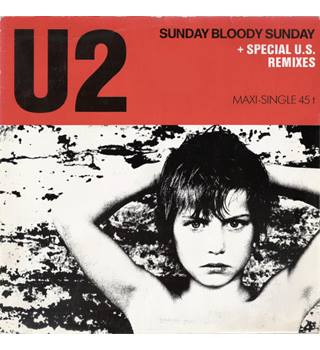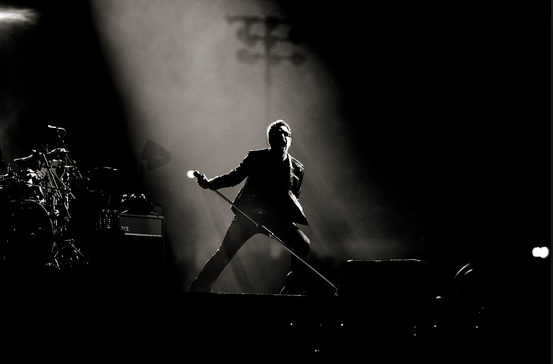
Beatles biographer John Blaney felt that Lennon's need to express his disgust at the incident caused him to write a song that is "a piece of pro- Republican propaganda that ignored the historical facts in favour of emotional blackmail". Ben Urish and Ken Bielen explain that the lyrics "start off with some nice rhetorical spins and a modicum of insight" but eventually devolve into "lyrical hyperbole" as Lennon's anger takes over. The lyrics of "Sunday Bloody Sunday" express Lennon's anger. Lennon, who was living in New York at the time, was enraged by the massacre and wrote "Sunday Bloody Sunday" as an angry response. The killing was quickly dubbed "Bloody Sunday". On 30 January 1972 at a protest march in Derry, 13 marchers were killed by members of the 1st Battalion, Parachute Regiment.

Lennon had sympathies for the Roman Catholic Irish minority in Northern Ireland and had joined a protest in London on 11 August 1971 that attempted to pressure the British government into removing its troops from Northern Ireland, shortly before Lennon moved to New York. The song addresses the Bloody Sunday massacre of 1972 and is one of two on the album that addresses the contemporary Northern Ireland conflict, " The Luck of the Irish" being the other.

As U2 said in the live recording of the album Under a Blood Red Sky, Sunday Bloody Sunday is not a “rebel song,” and the meaning of its lyrics represents the shocked reaction of a young man in the Republic of Ireland, facing the hate and violence that divides those who should be united in the name of Christ.Īfter that, Sunday Bloody Sunday became the first track in the album War, released in March 1983." Sunday Bloody Sunday" is a song written by John Lennon and Yoko Ono that was first released on their 1972 Plastic Ono Band album with Elephant's Memory, Some Time in New York City. But if you don’t like it, we’ll never play it again.”Īt the end of the execution, the audience welcomed the song with an ovation, and from that moment on, it was played in almost all their concerts. “It’s called Sunday Bloody Sunday, it’s about us, Irish people. It was presented to the public with these words:

The song was first performed in public in December 1982 in Belfast, Northern Ireland, three months before the release of the album War. Ten years after the Bloody Sunday, the memory was still alive, and it inspired their song Sunday Bloody Sunday. Paul responded to the announcement with Adam Clayton, David Howell Evans, and his brother Dick Evans: the band’s first formation was ready. On September 20th, 1976, Larry Mullen posted a message on the school board looking for young musicians to create a band. His anger channeled him into an artistic partnership with a group of friends she met at the Mount Temple School in Dublin, frequented by Protestants and Catholics. In his adolescence, he got in touch with many gangs on the streets, but he managed to stay out of them, growing with a sensibility against violence, injustice, and oppression. That Sunday, Paul Hewson was eleven years old, living in the suburbs of Dublin his father was Catholic, and his mother was Protestant. The first to dedicate a song to this dramatic event was Paul McCartney with Give Ireland Back to the Irish, released on February 25th, 1972, followed by John Lennon in June of that year, with Sunday Bloody Sunday on the album Some Time in New York City. That day was a dramatic Sunday of blood and terror. John Johnston was not a protester he was killed only because he was there at that moment. The shooting lasted a few minutes, and many were hit in the back while trying to escape.īernard McGuigan was killed while waving a white handkerchief and trying to help Patrick Doherty, wounded on the ground.

Thirteen young protesters died, and many were wounded. The crowd began to disperse in an attempt to escape the bullets. On Sunday, January 30th, 1972, in Derry, during an unauthorized demonstration, the paratroopers, commanded by Colonel Wilford, opened fire against the crowd. There were demonstrations almost every day until the clashes escalated. Among the many special laws written by London to limit the independentist forces, one, in particular, received strong reactions: it was called internment, and it gave the police the possibility to arrest a suspect indefinitely without any obligation to comply with procedural deadlines for the process. It was not only a geographic or religious matter (the Irish were most Catholics, whereas the English were Protestant it was mainly a social issue.īritish troops, armed with tanks, occupied the streets. Sunday Bloody Sunday: the story, lyrics & meaning of the songĪt the end of the 60s, Northern Ireland suffered a bitter conflict aimed at achieving independence from the United Kingdom.


 0 kommentar(er)
0 kommentar(er)
